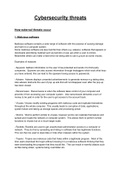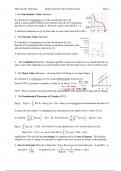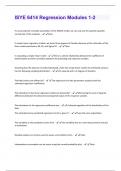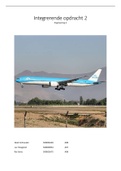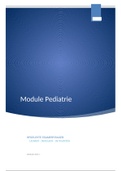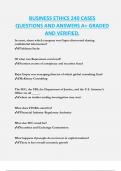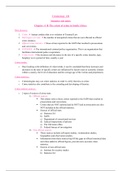Samenvatting Contemporary issues in International Politics
Intro, A doubtful victory & Distrust and content: the pendulum:
Winter 1989 = fall of the Berlin wall -> 1 year later = Iron Curtain Soviet Union – West came down
= followed by period of opening, fading political fault lines, lowering barriers trade
= age of globalization = growing connectivity, commerce, prosperity, growth
= remaining authoritarianism would make place for freedom
= Liberal Democracy gaining ground
= High tide of globalization = exit era of iron = opportunities for all
= golden age of industrialization (ideal order) <-> hierarchies
= emerging powers = South Korea, China & Vietnam got access to technology, capital,
consumer markets of Japan, US & Western Europe
= the west benefited from cheap goods, specialized into services
= countries in Africa, Latin America, Middle East profited from raw material exports &
investment
= China’s arrival has improved Africa’s infrastructure & boosted manufacturing sector
= Convergence = trade propelled specialization btw nations & specialization brought more growth
= threats = expected countries work together
= exp. Criminals penetrating digital networks,…
= Security interdependence = global common goods requiring an common policy
A missed opportunity
= Pendulum swung back = 2019 wall btw US – Mexico, Brexit
= turning point btw period of opening – period of fragmenting
= globalization – de-globalization, sovereignty & autonomy
= center of global order, liberal values, the West = cast adrift
= Nationalism & authoritarianism on the offense
= democratic India = Hindu-nationalist politicians exploited resentment a minority (Muslims)
= South Africa = legacy of freedom fighters replaced by nationalism & xenophobia
= competition about territory = Iraq – Kuwait, India – Pakistan, China – Kashmir, Russia –
Crimea, adjacent seas,…
= Germany = delaying export medical equipment corona pandemic
= Pandemic = instead of joining forces, major powers unleashed propaganda war = exposing
weakness, disaster management in countries
= Return of nationalism = not reduced to isolated events -> more fundamental fragmentation
= 1990s = increase in economic globalization & democratization
= 2000-2009 = economic globalization advanced & democratization stagnated
= 2010-2020 = economic globalization stagnated, democratization receded & global military
spendings surpassed Cold War record -> number of armed conflicts increased
= How could it be that the age of globalization bred so much nationalism?
= Western world = immense power, lack wisdom
= wisdom = to preserve social cohesion, use of power with prudence on global scene
& use historical wealth to build attractive economic future
= no longer idea about how to advance, next stage of development
= 3 decades of relative peace in West = long-missed opportunity, a crisis of politics,
diplomacy & civilization
1
, = prosperity as cause of decay
= Western democracy as incubator of demagogy = nationalist remedies put
responsibility of decay on others
= No single explanation for upsurge of nationalism & turbulence = combination elements
= failure of politics to deal with complexity
= Harmony contested
= golden ages (1989-2020) = remained challenging times to many
= Developing countries = globalization permitting consumers N-A/EU to benefit from
resources & cheap labor
= many dissatisfied = wanted to change the order & les dependent on the West
= after turn century = EU/US citizens purchasing power stagnate, very top flourished
= US = satisfaction abt state country declined
= West & else = frustration about cosmopolitanism brewing for years
= Power shift = world retreats into conflict positions
= power = capacity to make others do what they otherwise wouldn’t do
= possessing the economic, political, military, moral weight to influence
behavior
= thucydides trap = rise of one -> fear -> war with lesser power
= West = after collapse of Soviet Union = world’s center of power & dedicates rules
= becoming part of orbit of influence through NATO, EU & participation in
international organization
= extern = position eroded = other powers contest Western interests
= intern = loss of power = social distress & waning legitimacy of center
politics
= Decadence trap = rise of China & uncertainty in instilled = conflict unavoidable
= instead of preserving wealth at home by building more advanced & sustainable
industries = large Western markets imported raw materials & consumer goods
= piled up debts & made competitors rich
= consumerism = expense of civic duty & entrepreneurialism
= Free world made authoritarism strong = China benefiting from Western consumerism
= China’s capitalist model = trade surplus used for strategic purpose
= Influence of the West undermined with its own money
= Europe depended on import gas/energy
= energy imports helped authoritarian regimes in Gulf preserve their power & export
radical Islamism
= investing in economic beneficial situations not in democratic beneficial situations
= Hubris or excessive self-confidence = leading world taking power for granted without
considering consequences.
= blind faith military technology = remote-control interventionism, assumption that
governments could bombed into obedience, violence to control, democracy installed
by means of dysfunctional combination of hard power & humanitarianism
= by time West understand need for sustained presences & sophisticated
engagement = interest other disappeared
= mark on international cooperation = Western expectations = other powers
becoming responsible (liberal) stakeholders & subscribe to its rule (double standards)
= others = cooperation means to serve to end amassing power
2
, = School of strife = countries find out that is was easier to grow rich through openness
= at the same time = positive learning superseded by negative learning
= Interventionism taught them that weak still obey strong, economic
dependency is selfishly exploited, benign intentions can never taken granted
= weak learned = sovereignty & power
= negative socialization = imprint outlook of world politics (school of peace)
= interventionism inspired others = West intervenes in Yugoslavia -> inspired Moscow
= Changing nature of power = distribution power changed & its nature
= economy = automation/digitization = more production – fewer people
= productivity gains were beneficial = benefits disproportionally to those in
possession of capital
= productivity allowed citizens to work less <-> pressure to work harder
increased in other countries
= growth-wellbeing gap -> social anxiety
= globalization = products cheaper = smoke screen
+ hidden costs of pollution
+ devastating consequences of financial speculation
+ social instability caused by exploitation
= Limits of learning = high years of information -> without determination with info
= information = no guaranty on change
= many challenges identified at early stage by experts
= governments promised to respond = response often slow/absent
= there was knowledge = societies were reluctant to let it shape their decisions
= societies often seemed to prefer to remain oblivious
Gray zone
= Kenneth Waltz = it is not domestic politics that shape the behavior of states, but the world system.
They are forced by behavior of others to defend their interests (= school of strife).
= Russia 1990s = interest in replacing the antagonistic policy of the West with a policy of
accommodation & integration.
= distrust & lack of interest of the West & latent nationalism -> battle modus
= same with China
= study of world politics also about non-state actors
= cities, companies, NGO’s, opposition movements
= states remain powerful actors = understanding their interactions with non-state actors
= influence in both directions
= also applies for international organizations = multilateralism remains power politics
= importance of gray zone or hybrid war (politics = always gray zone)
= states confront each other just below the threshold of a full-blown war
= exp. Russia gaining control over Crimean Peninsula & staged proxy war in East Ukraine
= exp. China builds merchant ships sturdy enough to carry tanks & used small fishing boats to
assert territorial claims
= states going guerrilla:
= Iran supported proxies & let them launch missiles against adversaries
= Russia paid Afghani fighters to kill US soldiers
= China’s inducing of foreign companies to give up technological secrets
= way to balance power & make its military stronger
3
, = Hybrid = related to information wars (exp. Russian interference with US elections 2016)
= authoritarian regimes from Gulf = permanent campaign against Western societies
to seem as trustworthy partners
= Why are Western societies sensitive to misinformation & propaganda?
= importance of neglect of civic education & fickle patriotism
= hard to win an information war when citizens not dedicated to truth
= struggle for info dominance = perpetual concern, long before globalization
= migration = power of proximity – provincialism
= debate in class = rise nationalism
= economic crisis comes with fear & distrust
= the rise in international xenophobia = looking for someone/”the other” to blame
= being in a interlocked economic system = when one falls others follow
= nationalistic sentiments didn’t completely fade
= taking advantageous of times of crisis
= age of wealth -> age of scarcity = global uncertainty
= migration = new ideas + new cultural shocks
= debate in class = following 10 years will be challenging
= depends on outcome of Ukraine-Russia
= rise in nationalistic sentiments around the world
= growing multipolarity (more great powers) = unpredictable character of losing power
= fragmentation, difficult decision making, polarization
= contribution = strongly believe in citizen participation = positive consequences
Intro, A doubtful victory & Distrust and content: chapter 1 – progress:
Why should we question the progress made after the Cold War?
= trade, growth & prosperity = golden age – last 30y
= 1990-2019 = world trade increased (6X), gross production grew 4X, number people living in
extreme poverty decreased 70%
= few economic dips = 2001, 2009 & 2015 = global economy recovered (upward curve)
= Steven Pinker = globalization = cosmic force, born out of age of enlightenment
= globalization improved = health, prosperity, security & wellbeing
= Hans Rosling = made same argument in Factfulness
= Yuval Noah Harari = world has become a better & more peaceful place
= Poverty rate reduced = still millions live in destitution = humanitarian tragedy & security challenge
= it suffices that out of the poor masses a tiny fraction grows angry -> leading to anarchy
The Weakening of the west
= 1990s = West = 60% world’s economic production, 50% manufacturing & 13% world’s population
= dominance diminished = decrease of public satisfaction & trust in politics
= economic weakening = important external consequences (still crucial partner)
= exp. Great powers build on external depts
= less production/innovation -> decline great power -> depending on others
= weakening of military power = empowered other countries as security actors
= despite decline = Westerns economies resilient = trade & domestic production grew
= participated intensively in globalization, but economies grew slower
= poorest 40% suffered = disposable income did not grow
= income that can be spend, corrected for inflation
4
Intro, A doubtful victory & Distrust and content: the pendulum:
Winter 1989 = fall of the Berlin wall -> 1 year later = Iron Curtain Soviet Union – West came down
= followed by period of opening, fading political fault lines, lowering barriers trade
= age of globalization = growing connectivity, commerce, prosperity, growth
= remaining authoritarianism would make place for freedom
= Liberal Democracy gaining ground
= High tide of globalization = exit era of iron = opportunities for all
= golden age of industrialization (ideal order) <-> hierarchies
= emerging powers = South Korea, China & Vietnam got access to technology, capital,
consumer markets of Japan, US & Western Europe
= the west benefited from cheap goods, specialized into services
= countries in Africa, Latin America, Middle East profited from raw material exports &
investment
= China’s arrival has improved Africa’s infrastructure & boosted manufacturing sector
= Convergence = trade propelled specialization btw nations & specialization brought more growth
= threats = expected countries work together
= exp. Criminals penetrating digital networks,…
= Security interdependence = global common goods requiring an common policy
A missed opportunity
= Pendulum swung back = 2019 wall btw US – Mexico, Brexit
= turning point btw period of opening – period of fragmenting
= globalization – de-globalization, sovereignty & autonomy
= center of global order, liberal values, the West = cast adrift
= Nationalism & authoritarianism on the offense
= democratic India = Hindu-nationalist politicians exploited resentment a minority (Muslims)
= South Africa = legacy of freedom fighters replaced by nationalism & xenophobia
= competition about territory = Iraq – Kuwait, India – Pakistan, China – Kashmir, Russia –
Crimea, adjacent seas,…
= Germany = delaying export medical equipment corona pandemic
= Pandemic = instead of joining forces, major powers unleashed propaganda war = exposing
weakness, disaster management in countries
= Return of nationalism = not reduced to isolated events -> more fundamental fragmentation
= 1990s = increase in economic globalization & democratization
= 2000-2009 = economic globalization advanced & democratization stagnated
= 2010-2020 = economic globalization stagnated, democratization receded & global military
spendings surpassed Cold War record -> number of armed conflicts increased
= How could it be that the age of globalization bred so much nationalism?
= Western world = immense power, lack wisdom
= wisdom = to preserve social cohesion, use of power with prudence on global scene
& use historical wealth to build attractive economic future
= no longer idea about how to advance, next stage of development
= 3 decades of relative peace in West = long-missed opportunity, a crisis of politics,
diplomacy & civilization
1
, = prosperity as cause of decay
= Western democracy as incubator of demagogy = nationalist remedies put
responsibility of decay on others
= No single explanation for upsurge of nationalism & turbulence = combination elements
= failure of politics to deal with complexity
= Harmony contested
= golden ages (1989-2020) = remained challenging times to many
= Developing countries = globalization permitting consumers N-A/EU to benefit from
resources & cheap labor
= many dissatisfied = wanted to change the order & les dependent on the West
= after turn century = EU/US citizens purchasing power stagnate, very top flourished
= US = satisfaction abt state country declined
= West & else = frustration about cosmopolitanism brewing for years
= Power shift = world retreats into conflict positions
= power = capacity to make others do what they otherwise wouldn’t do
= possessing the economic, political, military, moral weight to influence
behavior
= thucydides trap = rise of one -> fear -> war with lesser power
= West = after collapse of Soviet Union = world’s center of power & dedicates rules
= becoming part of orbit of influence through NATO, EU & participation in
international organization
= extern = position eroded = other powers contest Western interests
= intern = loss of power = social distress & waning legitimacy of center
politics
= Decadence trap = rise of China & uncertainty in instilled = conflict unavoidable
= instead of preserving wealth at home by building more advanced & sustainable
industries = large Western markets imported raw materials & consumer goods
= piled up debts & made competitors rich
= consumerism = expense of civic duty & entrepreneurialism
= Free world made authoritarism strong = China benefiting from Western consumerism
= China’s capitalist model = trade surplus used for strategic purpose
= Influence of the West undermined with its own money
= Europe depended on import gas/energy
= energy imports helped authoritarian regimes in Gulf preserve their power & export
radical Islamism
= investing in economic beneficial situations not in democratic beneficial situations
= Hubris or excessive self-confidence = leading world taking power for granted without
considering consequences.
= blind faith military technology = remote-control interventionism, assumption that
governments could bombed into obedience, violence to control, democracy installed
by means of dysfunctional combination of hard power & humanitarianism
= by time West understand need for sustained presences & sophisticated
engagement = interest other disappeared
= mark on international cooperation = Western expectations = other powers
becoming responsible (liberal) stakeholders & subscribe to its rule (double standards)
= others = cooperation means to serve to end amassing power
2
, = School of strife = countries find out that is was easier to grow rich through openness
= at the same time = positive learning superseded by negative learning
= Interventionism taught them that weak still obey strong, economic
dependency is selfishly exploited, benign intentions can never taken granted
= weak learned = sovereignty & power
= negative socialization = imprint outlook of world politics (school of peace)
= interventionism inspired others = West intervenes in Yugoslavia -> inspired Moscow
= Changing nature of power = distribution power changed & its nature
= economy = automation/digitization = more production – fewer people
= productivity gains were beneficial = benefits disproportionally to those in
possession of capital
= productivity allowed citizens to work less <-> pressure to work harder
increased in other countries
= growth-wellbeing gap -> social anxiety
= globalization = products cheaper = smoke screen
+ hidden costs of pollution
+ devastating consequences of financial speculation
+ social instability caused by exploitation
= Limits of learning = high years of information -> without determination with info
= information = no guaranty on change
= many challenges identified at early stage by experts
= governments promised to respond = response often slow/absent
= there was knowledge = societies were reluctant to let it shape their decisions
= societies often seemed to prefer to remain oblivious
Gray zone
= Kenneth Waltz = it is not domestic politics that shape the behavior of states, but the world system.
They are forced by behavior of others to defend their interests (= school of strife).
= Russia 1990s = interest in replacing the antagonistic policy of the West with a policy of
accommodation & integration.
= distrust & lack of interest of the West & latent nationalism -> battle modus
= same with China
= study of world politics also about non-state actors
= cities, companies, NGO’s, opposition movements
= states remain powerful actors = understanding their interactions with non-state actors
= influence in both directions
= also applies for international organizations = multilateralism remains power politics
= importance of gray zone or hybrid war (politics = always gray zone)
= states confront each other just below the threshold of a full-blown war
= exp. Russia gaining control over Crimean Peninsula & staged proxy war in East Ukraine
= exp. China builds merchant ships sturdy enough to carry tanks & used small fishing boats to
assert territorial claims
= states going guerrilla:
= Iran supported proxies & let them launch missiles against adversaries
= Russia paid Afghani fighters to kill US soldiers
= China’s inducing of foreign companies to give up technological secrets
= way to balance power & make its military stronger
3
, = Hybrid = related to information wars (exp. Russian interference with US elections 2016)
= authoritarian regimes from Gulf = permanent campaign against Western societies
to seem as trustworthy partners
= Why are Western societies sensitive to misinformation & propaganda?
= importance of neglect of civic education & fickle patriotism
= hard to win an information war when citizens not dedicated to truth
= struggle for info dominance = perpetual concern, long before globalization
= migration = power of proximity – provincialism
= debate in class = rise nationalism
= economic crisis comes with fear & distrust
= the rise in international xenophobia = looking for someone/”the other” to blame
= being in a interlocked economic system = when one falls others follow
= nationalistic sentiments didn’t completely fade
= taking advantageous of times of crisis
= age of wealth -> age of scarcity = global uncertainty
= migration = new ideas + new cultural shocks
= debate in class = following 10 years will be challenging
= depends on outcome of Ukraine-Russia
= rise in nationalistic sentiments around the world
= growing multipolarity (more great powers) = unpredictable character of losing power
= fragmentation, difficult decision making, polarization
= contribution = strongly believe in citizen participation = positive consequences
Intro, A doubtful victory & Distrust and content: chapter 1 – progress:
Why should we question the progress made after the Cold War?
= trade, growth & prosperity = golden age – last 30y
= 1990-2019 = world trade increased (6X), gross production grew 4X, number people living in
extreme poverty decreased 70%
= few economic dips = 2001, 2009 & 2015 = global economy recovered (upward curve)
= Steven Pinker = globalization = cosmic force, born out of age of enlightenment
= globalization improved = health, prosperity, security & wellbeing
= Hans Rosling = made same argument in Factfulness
= Yuval Noah Harari = world has become a better & more peaceful place
= Poverty rate reduced = still millions live in destitution = humanitarian tragedy & security challenge
= it suffices that out of the poor masses a tiny fraction grows angry -> leading to anarchy
The Weakening of the west
= 1990s = West = 60% world’s economic production, 50% manufacturing & 13% world’s population
= dominance diminished = decrease of public satisfaction & trust in politics
= economic weakening = important external consequences (still crucial partner)
= exp. Great powers build on external depts
= less production/innovation -> decline great power -> depending on others
= weakening of military power = empowered other countries as security actors
= despite decline = Westerns economies resilient = trade & domestic production grew
= participated intensively in globalization, but economies grew slower
= poorest 40% suffered = disposable income did not grow
= income that can be spend, corrected for inflation
4

